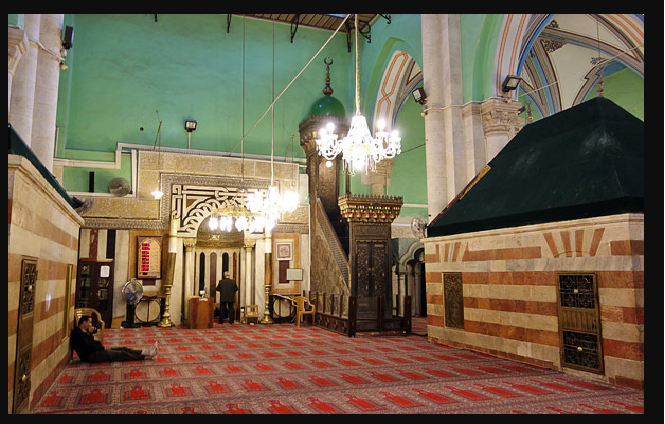Graves of Prophet Ibrahim ,His Wife Sara peace be upon him and others are taking rest in the land of Palestine
Prophet Ibrahim (peace be upon him) holds a central and revered position in Islam. His life is seen as a model of unwavering faith, submission to the will of Allah, and devotion. Here’s a summary of his story in Islam:
Early Life and Struggle Against Idolatry:
Prophet Ibrahim (peace be upon him) was born into a society that worshiped idols. His own father, Azar (or Terah), was an idol-maker. From a young age, Ibrahim rejected the idea of idol worship and questioned the beliefs of his people. He reasoned that idols could not possess the power to create or control the universe, and he sought to understand the true nature of God.
To demonstrate the futility of idol worship, Prophet Ibrahim destroyed the idols in the temple, leaving only the largest one. When the people demanded an explanation, he told them to ask the remaining idol, showing that it couldn’t respond or defend itself. This act angered his people, and they attempted to burn him alive, but Allah miraculously saved him, turning the fire cool and safe for him.
Journey of Faith and Prophethood:
After leaving his homeland, Ibrahim continued his journey, spreading the message of monotheism (belief in one God). His travels took him to various lands, where he preached the worship of Allah alone.
The Test of Sacrifice:
One of the most significant events in Prophet Ibrahim’s life was when Allah tested his faith by commanding him to sacrifice his beloved son, Ismail (peace be upon him). Both father and son were willing to submit to Allah’s command, but at the last moment, Allah replaced Ismail with a ram, thus sparing his life. This act of obedience and sacrifice is commemorated annually by Muslims during the festival of Eid al-Adha.
Building the Kaaba:
Allah instructed Prophet Ibrahim and his son Ismail to build the Kaaba, the sacred house of worship in Makkah. The Kaaba became the center of worship for all Muslims, and it remains the direction (Qibla) to which Muslims turn in prayer.
Legacy:
Prophet Ibrahim is regarded as the patriarch of many prophets, including his sons Ismail and Ishaq (peace be upon them). His unwavering faith and trust in Allah serve as a model for Muslims. He is known as “Khalilullah,” meaning the friend of Allah, a title that reflects his closeness to God.
His life story emphasizes key Islamic values: submission to God’s will, faith, patience, and trust in divine wisdom. Prophet Ibrahim’s story is mentioned in several places in the Quran, and he is honored by Muslims, Jews, and Christians alike as a key figure in monotheistic tradition.
This is a concise overview, but the story of Prophet Ibrahim (peace be upon him) is rich with lessons on faith and devotion. Let me know if you’d like to explore any part of his story in more detail!

